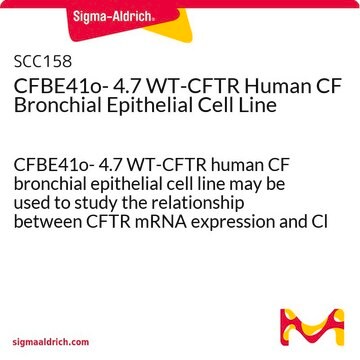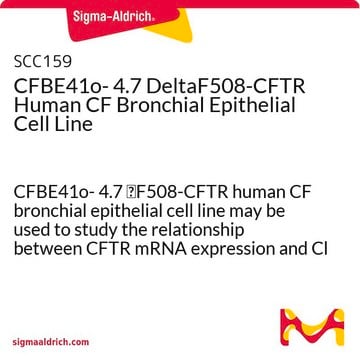SCC151
CFBE41o- Human CF Bronchial Epithelial Cell Line
Human
Synonym(s):
CFBE41o, CF41o, CFBE
About This Item
Recommended Products
product name
CFBE41o- Human CF Bronchial Epithelial Cell Line, CFBE41o- human CF bronchial epithelial cell line was derived from a cystic fibrosis patient homozygous for the ΔF508 CFTR mutation.
biological source
human
technique(s)
cell based assay: suitable
cell culture | mammalian: suitable
shipped in
ambient
General description
CFBE41o- is a CF human bronchial epithelial cell line, derived from a CF patient homozygous for the ΔF508 CFTR mutation and immortalized with the origin-of-replication defective SV40 plasmid (pSVori-) . CFBE14o- displays all ion transport properties characteristic of cystic fibrosis such as defective cAMP-dependent chloride transport and intact calcium-dependent chloride transport. Under appropriate culture conditions, CFBE41o- forms tight junctions to give a polarized epithelium .
The CFBE41o- cell line has also been used to generate subclones complemented with wild-type or ΔF508CFTR that possess differing levels of transgene-derived CFTR mRNA expression . These complemented CFBE41o- subclones (Cat. No. SCC158 – SCC161) suggest a direct correlation in CFTR mRNA expression levels to the number of active CFTR channels .
Cell Line Description
Application
Quality
• Cells are tested by PCR and are negative for HPV-16, HPV-18, Hepatitis A, C, and HIV-1 & 2 viruses as assessed by a Human Essential CLEAR panel by Charles River Animal Diagnostic Services.
• Cells are negative for mycoplasma contamination.
• Each lot of cells is genotyped by STR analysis to verify the unique identity of the cell line.
Storage and Stability
Disclaimer
Unless otherwise stated in our catalog or other company documentation accompanying the product(s), our products are intended for research use only and are not to be used for any other purpose, which includes but is not limited to, unauthorized commercial uses, in vitro diagnostic uses, ex vivo or in vivo therapeutic uses or any type of consumption or application to humans or animals.
Storage Class Code
10 - Combustible liquids
WGK
WGK 1
Flash Point(F)
Not applicable
Flash Point(C)
Not applicable
Certificates of Analysis (COA)
Search for Certificates of Analysis (COA) by entering the products Lot/Batch Number. Lot and Batch Numbers can be found on a product’s label following the words ‘Lot’ or ‘Batch’.
Already Own This Product?
Find documentation for the products that you have recently purchased in the Document Library.
Customers Also Viewed
Our team of scientists has experience in all areas of research including Life Science, Material Science, Chemical Synthesis, Chromatography, Analytical and many others.
Contact Technical Service








